Unit 2 What time do you go to school?词汇课件21张
文档属性
| 名称 | Unit 2 What time do you go to school?词汇课件21张 |
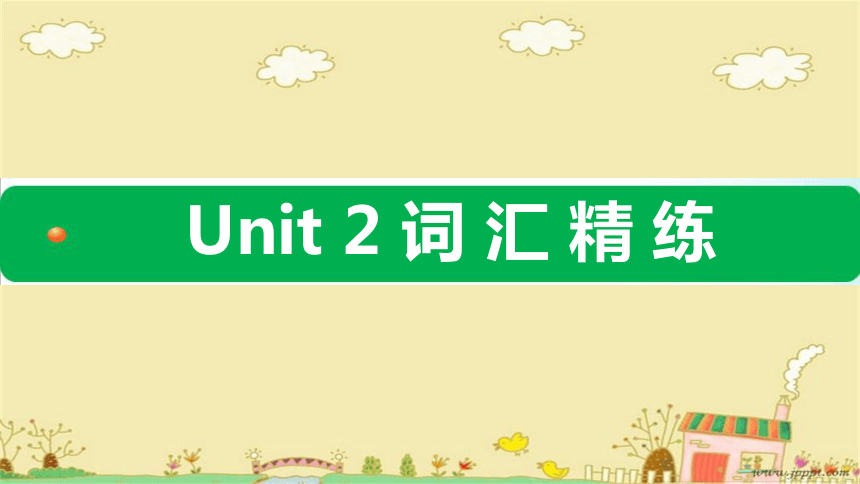
|
|
| 格式 | zip | ||
| 文件大小 | 218.4KB | ||
| 资源类型 | 教案 | ||
| 版本资源 | 人教新目标(Go for it)版 | ||
| 科目 | 英语 | ||
| 更新时间 | 2021-12-11 00:00:00 | ||
图片预览

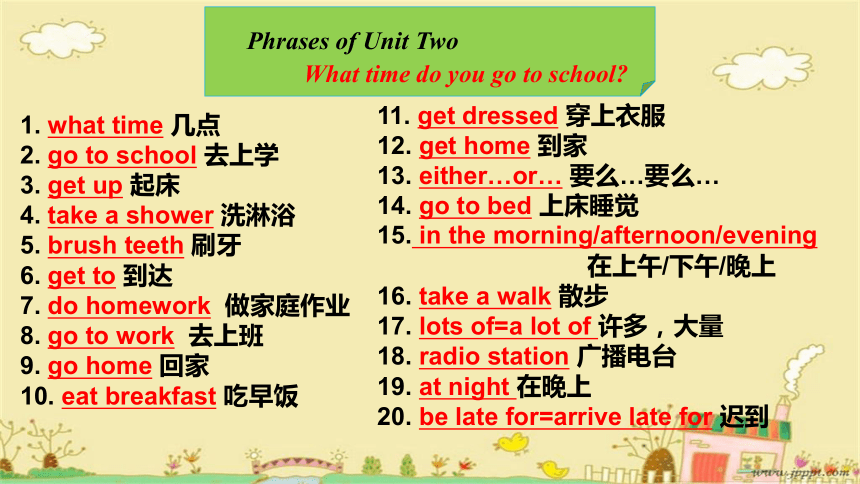
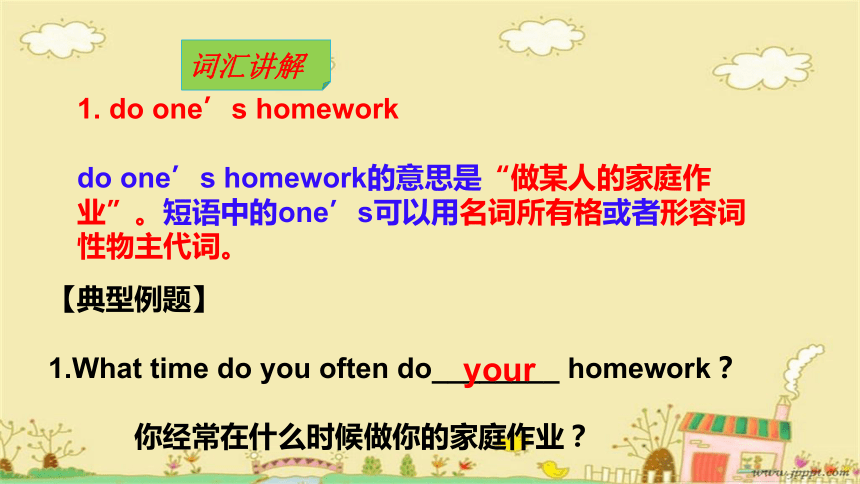
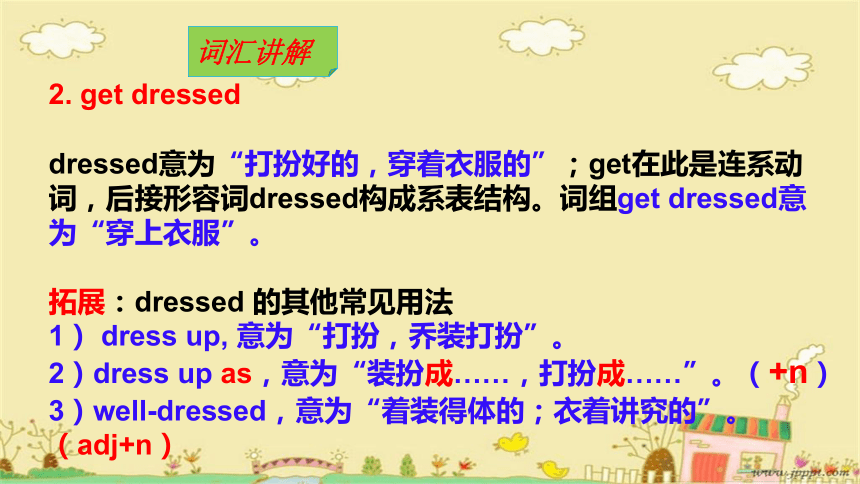
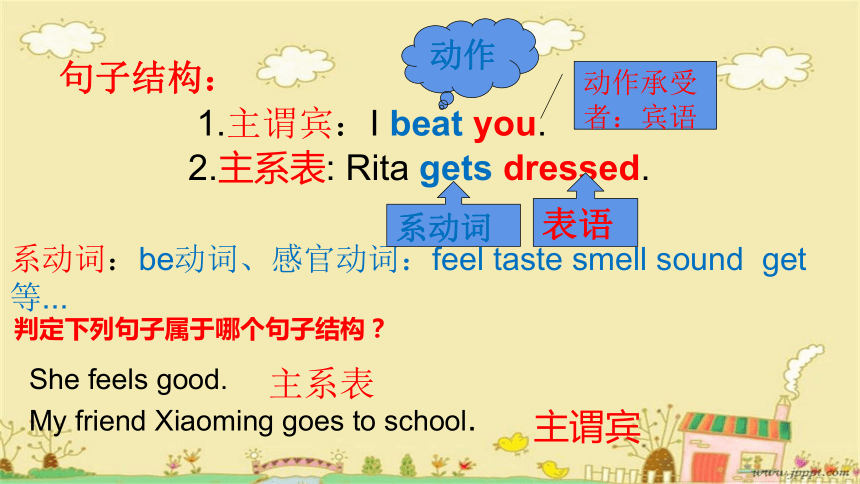
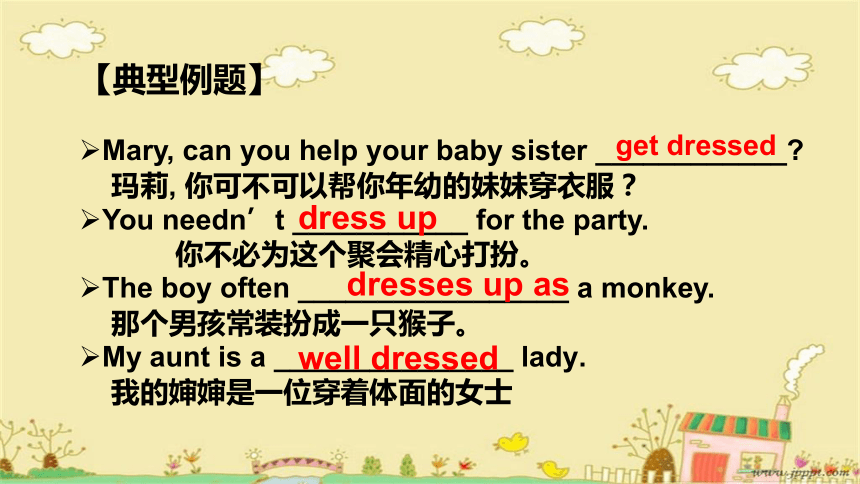
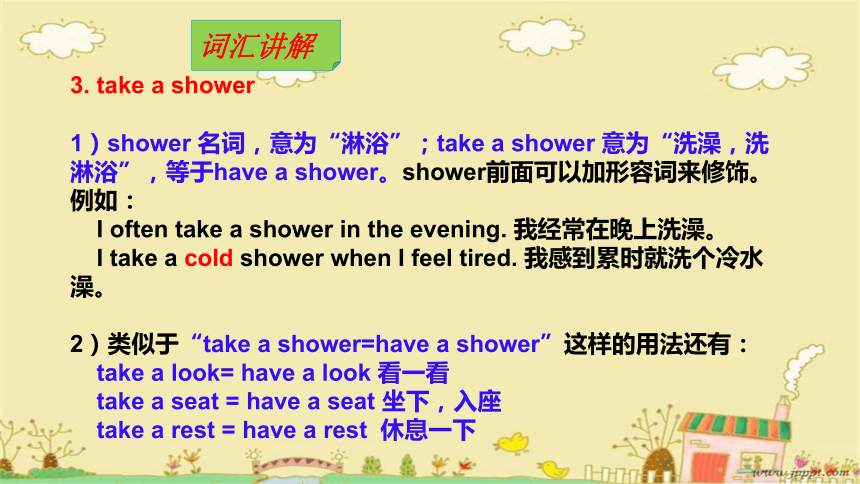
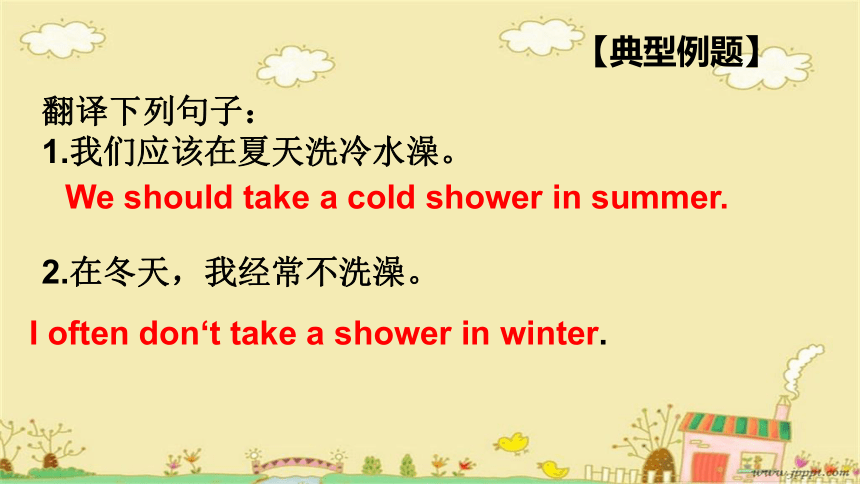
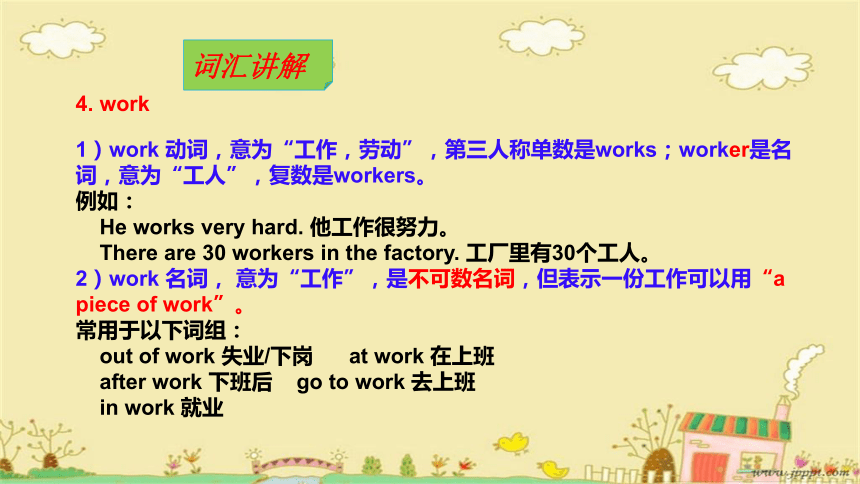
文档简介
(共21张PPT)
Unit 2 词 汇 精 练
Phrases of Unit Two
What time do you go to school
11. get dressed 穿上衣服
12. get home 到家
13. either…or… 要么…要么…
14. go to bed 上床睡觉
15. in the morning/afternoon/evening
在上午/下午/晚上
16. take a walk 散步
17. lots of=a lot of 许多,大量
18. radio station 广播电台
19. at night 在晚上
20. be late for=arrive late for 迟到
1. what time 几点
2. go to school 去上学
3. get up 起床
4. take a shower 洗淋浴
5. brush teeth 刷牙
6. get to 到达
7. do homework 做家庭作业
8. go to work 去上班
9. go home 回家
10. eat breakfast 吃早饭
1. do one’s homework
do one’s homework的意思是“做某人的家庭作业”。短语中的one’s可以用名词所有格或者形容词性物主代词。
词汇讲解
【典型例题】
1.What time do you often do________ homework?
你经常在什么时候做你的家庭作业?
your
2. get dressed
dressed意为“打扮好的,穿着衣服的”;get在此是连系动词,后接形容词dressed构成系表结构。词组get dressed意为“穿上衣服”。
拓展:dressed 的其他常见用法
1) dress up, 意为“打扮,乔装打扮”。
2)dress up as,意为“装扮成……,打扮成……”。(+n)
3)well-dressed,意为“着装得体的;衣着讲究的”。 (adj+n)
词汇讲解
句子结构:
1.主谓宾:I beat you.
2.主系表: Rita gets dressed.
系动词:be动词、感官动词:feel taste smell sound get 等...
She feels good.
My friend Xiaoming goes to school.
主系表
主谓宾
动作
动作承受者:宾语
系动词
表语
判定下列句子属于哪个句子结构?
【典型例题】
Mary, can you help your baby sister ____________
玛莉, 你可不可以帮你年幼的妹妹穿衣服?
You needn’t ___________ for the party.
你不必为这个聚会精心打扮。
The boy often _________________ a monkey.
那个男孩常装扮成一只猴子。
My aunt is a _______________ lady.
我的婶婶是一位穿着体面的女士
get dressed
dress up
dresses up as
well dressed
3. take a shower
1)shower 名词,意为“淋浴”;take a shower 意为“洗澡,洗淋浴”,等于have a shower。shower前面可以加形容词来修饰。
例如:
I often take a shower in the evening. 我经常在晚上洗澡。
I take a cold shower when I feel tired. 我感到累时就洗个冷水澡。
2)类似于“take a shower=have a shower”这样的用法还有:
take a look= have a look 看一看
take a seat = have a seat 坐下,入座
take a rest = have a rest 休息一下
词汇讲解
【典型例题】
翻译下列句子:
1.我们应该在夏天洗冷水澡。
2.在冬天,我经常不洗澡。
We should take a cold shower in summer.
I often don‘t take a shower in winter.
4. work
1)work 动词,意为“工作,劳动”,第三人称单数是works;worker是名词,意为“工人”,复数是workers。
例如:
He works very hard. 他工作很努力。
There are 30 workers in the factory. 工厂里有30个工人。
2)work 名词, 意为“工作”,是不可数名词,但表示一份工作可以用“a piece of work”。
常用于以下词组:
out of work 失业/下岗 at work 在上班
after work 下班后 go to work 去上班
in work 就业
词汇讲解
不可数名词怎么表达?
基数词+量词+of+名词
a glass of water 一杯牛奶
two glasses of water 两杯牛奶
5. funny
1)funny 形容词, 意为“有趣的,可笑的,滑稽的,奇怪的”;意为“有趣”时,相当于“interesting”。
例如:
What a funny (an interesting) story! 多么有趣的故事啊!
The machine is making a very funny noise.
这部机器发出一种很怪的声音。
2)fun 是funny的名词形式,意为“乐趣,娱乐,嬉戏,有趣的事”。常用于词组have fun doing sth表示“做某事很开心。
例如:
Life isn’t all fun; it has its bad moments.
人生不仅有乐趣, 也有令人不快的时刻。
We have fun playing in the park on weekends.
每周末我们都在公园里玩得很快活。
词汇讲解
【典型例题】
1.I think this story is so_____.
A.funny B.fun C.fan D.fans
2.They have fun______ outside.
A.having picnic B.had picnic C.have picnic
6. exercise
1)exercise 作动词,意为“运动,锻炼”等时,
例如:
Every day I exercise before I go to sleep.
我每天睡觉前锻炼。
We should constantly exercise our muscles.
我们应当经常锻炼肌肉。
2)exercise 作名词,意为“练习;操”等时,是可数名词。意为“锻炼”时,是不可数名词。
例如:
We should do eye exercises. 我们应该做眼保健操。
Let's take exercise together. 让我们一起锻炼吧。
词汇讲解
【典型例题】
1.You need to ______ more. Don’t always be at the desk busy doing your _________.
A.exercise, exercise B.exercises, exercises
C.exercises, exercise D.exercise, exercises
2.Julia __________ every day and her school day begins with morning __________.
A.exercise; exercise B.exercises; exercise
C.exercise; exercises D.exercises; exercises
3.He often does at school.Look!He is doing morning__ over there.
A.exercise;exercise B.exercise;exercises
C.exercises;exercises D.exercises;exercise
7. quarter
1)quarter 作名词时,可以译为“四分之一”或者“一刻钟”。
例如:
A quarter of the apples are green. 有四分之一的苹果是青的。
It’s a quarter past seven. 七点一刻了。
词汇讲解
8. taste
1)taste做连系动词时,后面跟名词或者形容词作表语,构成主系表结构;意为“吃起来,尝起来”。
例如:
The soup tastes good. 这汤的味道不错。
The pizza tastes delicious. 比萨饼很好吃。
2)taste 还可以作名词,意为“味道,味觉,品味”等。
例如:
I like the taste of wine. 我喜欢葡萄酒的味道。
She has excellent taste in dress. 她在服装方面有极高的品味。
词汇讲解
9. life
life 名词,既可以是可数名词也可以是不可数名词。作“生活”讲时,是不可数名词;作“生命”讲时是可数名词,其复数是“lives”。
例如:
Life is like a journey. 生活像一次旅行。(不可数)
Three people lost their lives in the accident. 事故中三人丧生。(可数)
拓展:常见的使用life的词组有
live a … life 过……的日子
lose one’s life 丧生
save one’s life 救……的命
give one’s life 献身
come (back) to life 复活
词汇讲解
10. usually
1)usually是频度副词,意为“通常”,常位于be动词之后,实义动词之前,在句子中作状语; 但有时也可以放在句首修饰整个句子。
例如:
I usually go to school at seven o’clock.
我通常七点去上学。
It is usually in the morning that she sees her patients.
她通常在上午看望病人。
Usually, I get up early. 通常, 我起得很早。
2)usually的形容词是usual,意为“通常的,平常的”。常用于词组as usual,意为“像平常一样”。它的反义词是unusual,意为“罕有的,不同寻常的”。
例如:
She goes to work as usual. 她像平常一样去上班了。
It was an unusual day for summer. 这是夏季少有的一天。
词汇讲解
Ⅱ. 用括号内所给单词的适当形式填空
1. My mother often ________ (watch) TV at 7:00 every evening.
2. We usually have breakfast at six___________ (clock) in the morning.
3. What time does your sister ______ (go) home every day
4. Please come in and have a cup of tea with _______ (we).
【典型例题】
watches
o'clock
go
us
Ⅰ. 用适当的词填空,补全下面的短文。
I usually 1.________ (起床)at six o’clock. I have milk and bread for breakfast. After breakfast, I 2._______________(洗澡)and then I 3.__________ (上学)by bus. I get to school at a quarter to eight. I have five classes in the morning. And then I have lunch at twelve o’clock. In the afternoon I have two classes. I 4._________(回家)at half past four. I get home at 5:00. I 5.____________(吃晚饭)at about 6:00. After dinner, I 6._________________ (做作业). I 7.__________(睡觉)at 8:00. My life is busy but not exciting.
【综合练习】
get up
take a shower
go to school
go home
have supper
do my homework
go to bed
Goodbye
Unit 2 词 汇 精 练
Phrases of Unit Two
What time do you go to school
11. get dressed 穿上衣服
12. get home 到家
13. either…or… 要么…要么…
14. go to bed 上床睡觉
15. in the morning/afternoon/evening
在上午/下午/晚上
16. take a walk 散步
17. lots of=a lot of 许多,大量
18. radio station 广播电台
19. at night 在晚上
20. be late for=arrive late for 迟到
1. what time 几点
2. go to school 去上学
3. get up 起床
4. take a shower 洗淋浴
5. brush teeth 刷牙
6. get to 到达
7. do homework 做家庭作业
8. go to work 去上班
9. go home 回家
10. eat breakfast 吃早饭
1. do one’s homework
do one’s homework的意思是“做某人的家庭作业”。短语中的one’s可以用名词所有格或者形容词性物主代词。
词汇讲解
【典型例题】
1.What time do you often do________ homework?
你经常在什么时候做你的家庭作业?
your
2. get dressed
dressed意为“打扮好的,穿着衣服的”;get在此是连系动词,后接形容词dressed构成系表结构。词组get dressed意为“穿上衣服”。
拓展:dressed 的其他常见用法
1) dress up, 意为“打扮,乔装打扮”。
2)dress up as,意为“装扮成……,打扮成……”。(+n)
3)well-dressed,意为“着装得体的;衣着讲究的”。 (adj+n)
词汇讲解
句子结构:
1.主谓宾:I beat you.
2.主系表: Rita gets dressed.
系动词:be动词、感官动词:feel taste smell sound get 等...
She feels good.
My friend Xiaoming goes to school.
主系表
主谓宾
动作
动作承受者:宾语
系动词
表语
判定下列句子属于哪个句子结构?
【典型例题】
Mary, can you help your baby sister ____________
玛莉, 你可不可以帮你年幼的妹妹穿衣服?
You needn’t ___________ for the party.
你不必为这个聚会精心打扮。
The boy often _________________ a monkey.
那个男孩常装扮成一只猴子。
My aunt is a _______________ lady.
我的婶婶是一位穿着体面的女士
get dressed
dress up
dresses up as
well dressed
3. take a shower
1)shower 名词,意为“淋浴”;take a shower 意为“洗澡,洗淋浴”,等于have a shower。shower前面可以加形容词来修饰。
例如:
I often take a shower in the evening. 我经常在晚上洗澡。
I take a cold shower when I feel tired. 我感到累时就洗个冷水澡。
2)类似于“take a shower=have a shower”这样的用法还有:
take a look= have a look 看一看
take a seat = have a seat 坐下,入座
take a rest = have a rest 休息一下
词汇讲解
【典型例题】
翻译下列句子:
1.我们应该在夏天洗冷水澡。
2.在冬天,我经常不洗澡。
We should take a cold shower in summer.
I often don‘t take a shower in winter.
4. work
1)work 动词,意为“工作,劳动”,第三人称单数是works;worker是名词,意为“工人”,复数是workers。
例如:
He works very hard. 他工作很努力。
There are 30 workers in the factory. 工厂里有30个工人。
2)work 名词, 意为“工作”,是不可数名词,但表示一份工作可以用“a piece of work”。
常用于以下词组:
out of work 失业/下岗 at work 在上班
after work 下班后 go to work 去上班
in work 就业
词汇讲解
不可数名词怎么表达?
基数词+量词+of+名词
a glass of water 一杯牛奶
two glasses of water 两杯牛奶
5. funny
1)funny 形容词, 意为“有趣的,可笑的,滑稽的,奇怪的”;意为“有趣”时,相当于“interesting”。
例如:
What a funny (an interesting) story! 多么有趣的故事啊!
The machine is making a very funny noise.
这部机器发出一种很怪的声音。
2)fun 是funny的名词形式,意为“乐趣,娱乐,嬉戏,有趣的事”。常用于词组have fun doing sth表示“做某事很开心。
例如:
Life isn’t all fun; it has its bad moments.
人生不仅有乐趣, 也有令人不快的时刻。
We have fun playing in the park on weekends.
每周末我们都在公园里玩得很快活。
词汇讲解
【典型例题】
1.I think this story is so_____.
A.funny B.fun C.fan D.fans
2.They have fun______ outside.
A.having picnic B.had picnic C.have picnic
6. exercise
1)exercise 作动词,意为“运动,锻炼”等时,
例如:
Every day I exercise before I go to sleep.
我每天睡觉前锻炼。
We should constantly exercise our muscles.
我们应当经常锻炼肌肉。
2)exercise 作名词,意为“练习;操”等时,是可数名词。意为“锻炼”时,是不可数名词。
例如:
We should do eye exercises. 我们应该做眼保健操。
Let's take exercise together. 让我们一起锻炼吧。
词汇讲解
【典型例题】
1.You need to ______ more. Don’t always be at the desk busy doing your _________.
A.exercise, exercise B.exercises, exercises
C.exercises, exercise D.exercise, exercises
2.Julia __________ every day and her school day begins with morning __________.
A.exercise; exercise B.exercises; exercise
C.exercise; exercises D.exercises; exercises
3.He often does at school.Look!He is doing morning__ over there.
A.exercise;exercise B.exercise;exercises
C.exercises;exercises D.exercises;exercise
7. quarter
1)quarter 作名词时,可以译为“四分之一”或者“一刻钟”。
例如:
A quarter of the apples are green. 有四分之一的苹果是青的。
It’s a quarter past seven. 七点一刻了。
词汇讲解
8. taste
1)taste做连系动词时,后面跟名词或者形容词作表语,构成主系表结构;意为“吃起来,尝起来”。
例如:
The soup tastes good. 这汤的味道不错。
The pizza tastes delicious. 比萨饼很好吃。
2)taste 还可以作名词,意为“味道,味觉,品味”等。
例如:
I like the taste of wine. 我喜欢葡萄酒的味道。
She has excellent taste in dress. 她在服装方面有极高的品味。
词汇讲解
9. life
life 名词,既可以是可数名词也可以是不可数名词。作“生活”讲时,是不可数名词;作“生命”讲时是可数名词,其复数是“lives”。
例如:
Life is like a journey. 生活像一次旅行。(不可数)
Three people lost their lives in the accident. 事故中三人丧生。(可数)
拓展:常见的使用life的词组有
live a … life 过……的日子
lose one’s life 丧生
save one’s life 救……的命
give one’s life 献身
come (back) to life 复活
词汇讲解
10. usually
1)usually是频度副词,意为“通常”,常位于be动词之后,实义动词之前,在句子中作状语; 但有时也可以放在句首修饰整个句子。
例如:
I usually go to school at seven o’clock.
我通常七点去上学。
It is usually in the morning that she sees her patients.
她通常在上午看望病人。
Usually, I get up early. 通常, 我起得很早。
2)usually的形容词是usual,意为“通常的,平常的”。常用于词组as usual,意为“像平常一样”。它的反义词是unusual,意为“罕有的,不同寻常的”。
例如:
She goes to work as usual. 她像平常一样去上班了。
It was an unusual day for summer. 这是夏季少有的一天。
词汇讲解
Ⅱ. 用括号内所给单词的适当形式填空
1. My mother often ________ (watch) TV at 7:00 every evening.
2. We usually have breakfast at six___________ (clock) in the morning.
3. What time does your sister ______ (go) home every day
4. Please come in and have a cup of tea with _______ (we).
【典型例题】
watches
o'clock
go
us
Ⅰ. 用适当的词填空,补全下面的短文。
I usually 1.________ (起床)at six o’clock. I have milk and bread for breakfast. After breakfast, I 2._______________(洗澡)and then I 3.__________ (上学)by bus. I get to school at a quarter to eight. I have five classes in the morning. And then I have lunch at twelve o’clock. In the afternoon I have two classes. I 4._________(回家)at half past four. I get home at 5:00. I 5.____________(吃晚饭)at about 6:00. After dinner, I 6._________________ (做作业). I 7.__________(睡觉)at 8:00. My life is busy but not exciting.
【综合练习】
get up
take a shower
go to school
go home
have supper
do my homework
go to bed
Goodbye
同课章节目录
- Unit 1 Can you play the guitar?
- Section A
- Section B
- Unit 2 What time do you go to school?
- Section A
- Section B
- Unit 3 How do you get to school?
- Section A
- Section B
- Unit 4 Don't eat in class.
- Section A
- Section B
- Unit 5 Why do you like pandas?
- Section A
- Section B
- Unit 6 I'm watching TV.
- Section A
- Section B
- Review of Units 1-6
- Unit 7 It's raining!
- Section A
- Section B
- Unit 8 Is there a post office near here?
- Section A
- Section B
- Unit 9 What does he look like?
- Section A
- Section B
- Unit 10 I'd like some noodles.
- Section A
- Section B
- Unit 11 How was your school trip?
- Section A
- Section B
- Unit 12 What did you do last weekend?
- Section A
- Section B
